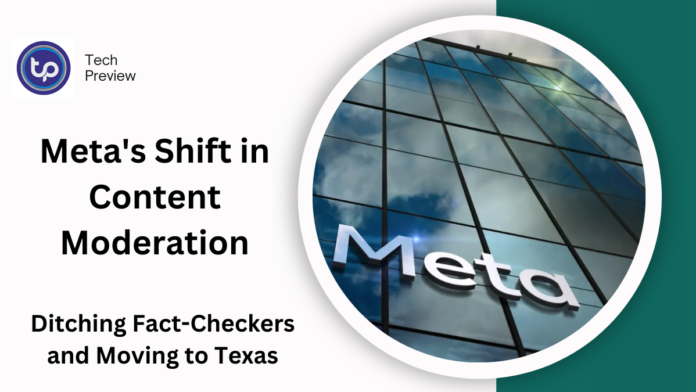Meta, the company behind Facebook, Instagram, and WhatsApp, has made a controversial move regarding its content moderation policies.
In what many see as an overture to the incoming Trump administration, Meta has decided to scale back its fact-checking operations.
This move, coupled with a shift of certain operations to Texas, is raising eyebrows across the tech and political landscape.
While Meta has presented this as a necessary adjustment to align with evolving political climates, experts and critics argue that it may signal a troubling shift in how the platform handles misinformation, political content, and user engagement.
What’s Changed at Meta?
Meta has significantly altered its approach to content moderation, particularly when it comes to fact-checking and political content.
Previously, the company had relied on independent fact-checking organizations to vet misinformation and ensure that users were exposed to accurate information.
These fact-checkers, which were partnered with third-party organizations, were tasked with flagging misleading posts and providing corrective context.
However, with its recent policy changes, Meta has decided to stop working with these external fact-checking groups.
Instead, the company plans to rely more on its internal teams and AI-powered systems to regulate content.
MUST READ: Meta’s Bold Move to Texas: A New Era for Content Moderation and Tech Innovation
Meta argues that this shift will allow for more flexibility and better alignment with the ever-changing political landscape, but many are concerned about the potential for misinformation to spread unchecked.
Why Is Meta Doing This Now?
The timing of these changes seems significant, given the political context.
the possibility of Donald Trump returning to the White House for a second term, Meta may be trying to avoid the perception of political bias in its content moderation.
For years, tech companies like Meta have faced accusations of censorship, with critics arguing that their content policies disproportionately targeted conservative viewpoints. By scaling back fact-checking and making other adjustments, Meta seems to be signaling its willingness to cater to a broader range of political opinions.
Potential Reasons Behind Meta’s Move:
- Political Strategy: With Trump’s potential return to office, Meta may be seeking to align itself with the future administration’s policies or at least avoid becoming a target of criticism.
- Business Interests: Meta may want to avoid alienating users who feel that the platform has been unfairly censoring their viewpoints.
- Regulatory Pressure: The decision could be influenced by external political pressure and lobbying from groups advocating for less stringent content moderation.
The Impact on Users and Content Moderation
Meta’s move to scale back on fact-checking could have significant consequences for its users and the overall content moderation process.
Fact-checking has been a critical part of ensuring that false information is flagged before it spreads across the platform.
With its reliance on AI and internal teams, Meta is signaling that it plans to take a more hands-off approach, which could raise concerns about misinformation.
Consequences of Ditching Fact-Checkers
- Increased Misinformation: Without third-party oversight, the risk of misinformation spreading unchecked could rise, particularly during contentious political events like elections.
- Echo Chambers: The reduction in fact-checking could allow certain political narratives to proliferate, reinforcing existing biases and echo chambers within users’ social media feeds.
- Trust Issues: Users who rely on fact-checkers to vet information may lose trust in Meta as a source of accurate information, especially when political content is involved.
Meta’s Move to Texas: A Business-Friendly Environment
Meta’s decision to relocate certain operations to Texas is also raising questions.
Just as many tech companies have made the move to Texas for its business-friendly environment, Meta is following suit.
The state’s lack of income tax, low cost of living, and growing tech industry are major factors that make Texas an attractive place for businesses.
However, the move also comes with political implications. Texas is known for its conservative policies, and the state has been at the forefront of pushing for less regulation in tech.
By relocating to Texas, Meta is positioning itself in alignment with a more conservative political climate, which could further fuel suspicions that the company is making a political statement with its content moderation changes.
How This Affects Content Moderation Going Forward
Meta’s overhaul of its content moderation strategy will likely have long-term implications for its platforms.
The absence of third-party fact-checkers means that Meta’s internal teams and algorithms will play an even larger role in regulating content.
While AI can be a powerful tool, it is still prone to errors, particularly when it comes to context and nuance.
Moreover, Meta’s decision to cut back on fact-checking could lead to more inconsistent moderation. S
Some content may still be flagged, while other content—particularly political content—may go unchecked. This could create a situation where users are exposed to more misinformation, especially in the run-up to major political events.
Key Implications:
- More Political Polarization: The lack of third-party fact-checking could exacerbate political divides, especially if users are presented with unfiltered content that aligns with their views.
- AI Limitations: Meta’s reliance on algorithms may result in overreach in some cases and missed opportunities to flag misleading content in others. Algorithms may struggle to accurately assess context, leading to mistakes.
- User Engagement: Users may become more polarized in their engagement with the platform, either gravitating toward content that supports their views or leaving in frustration over a perceived lack of neutrality.
What’s Next for Meta and Its Users?
As Meta navigates this shift in its content moderation strategy, the company will likely face increasing scrutiny from lawmakers, advocacy groups, and users.
While the decision to scale back fact-checking and relocate to Texas may provide Meta with financial benefits and a more favorable political environment, the platform’s ability to handle misinformation and ensure a balanced approach to content moderation will be tested.
Meta must walk a fine line between political neutrality and maintaining the integrity of its platform.
The move to reduce third-party fact-checkers may appear to be a bid for political neutrality, but it also runs the risk of amplifying harmful misinformation that could undermine public trust.
Conclusion
Meta’s decision to ditch fact-checkers and move to Texas is likely a strategic one, aimed at catering to a changing political landscape and positioning the company for future success under a potential Trump administration. While the business benefits are clear, the shift raises concerns about the future of content moderation, misinformation, and the platform’s role in shaping public discourse. Only time will tell how these changes will impact Meta’s reputation and user experience.
People May Ask
Why is Meta getting rid of its fact-checkers?
Meta is scaling back its use of third-party fact-checkers in an effort to align with a changing political landscape and reduce perceived censorship. It plans to rely more on internal teams and AI to manage content moderation.
How will Meta’s decision affect content modernation?
By reducing fact-checking, Meta risks allowing more misinformation to spread unchecked. This could lead to increased political polarization and a lack of trust among users.
What are the benefits of Meta moving to Texas?
Texas offers a business-friendly environment with tax advantages, low operational costs, and a growing tech ecosystem. This move may allow Meta to reduce costs while also aligning with a more conservative political climate.
What does this mean for Meta users?
Users may see changes in content moderation, particularly around political content. The reduction in fact-checking could result in more misinformation and a shift in the types of content users are exposed to.
Will Meta’s move affect its relationship with the government?
Meta’s decision to move to Texas and scale back fact-checking could be seen as a response to external political pressures. This move may help the company avoid regulatory scrutiny but could also draw criticism from those concerned about its handling of misinformation.
Click here to learn more.








